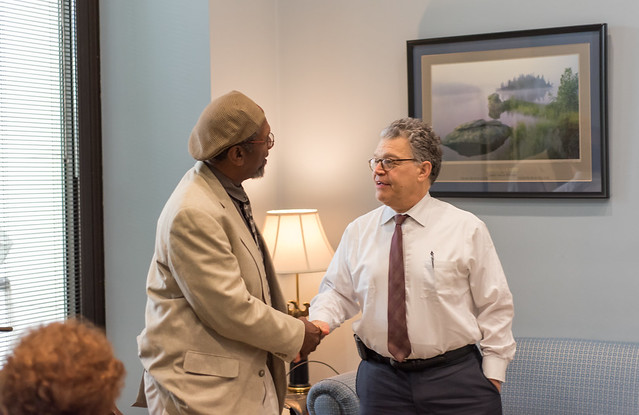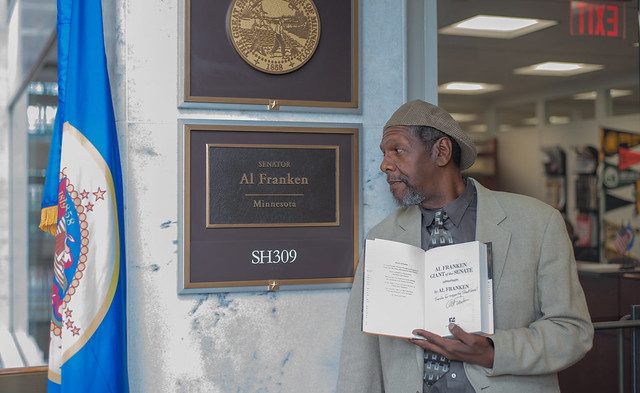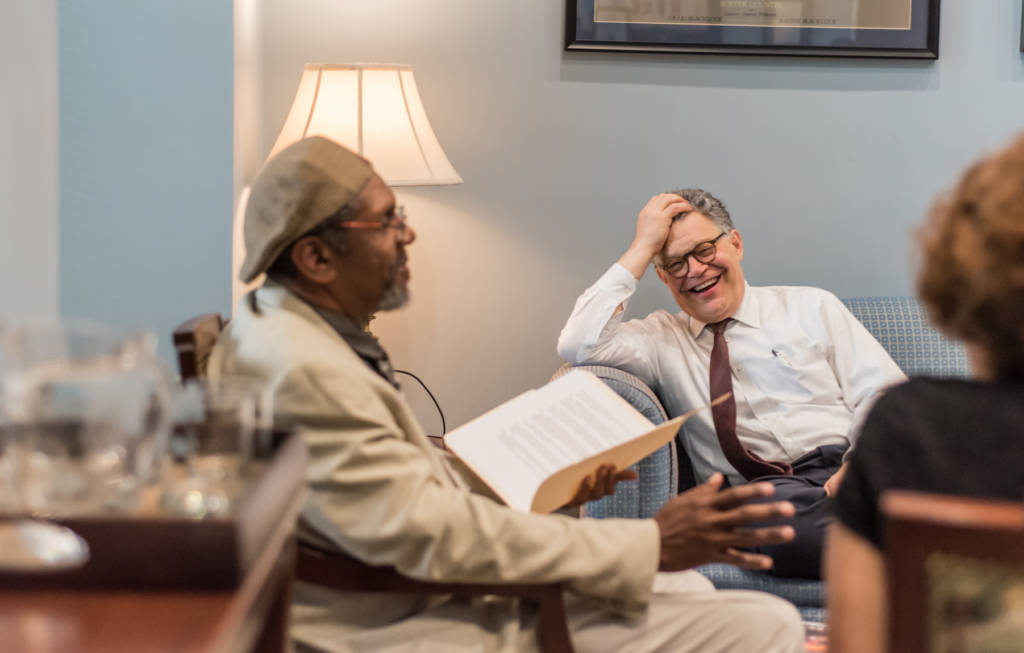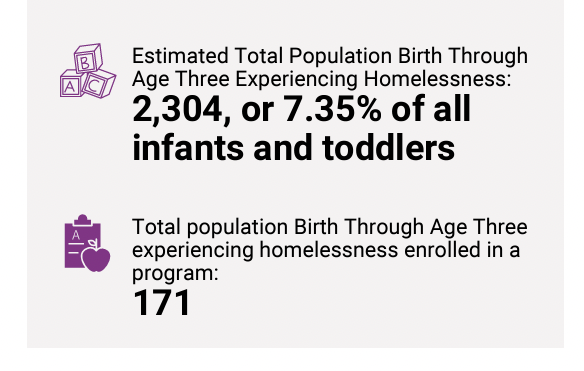Street Sense Vendor Ken Martin took advantage of a chance meeting with Senator Al Franken to arrange an interview. Franken was getting out of his car and Martin was nearby, doing what he normally does when he sells the paper. Remembering Franken’s questions during the confirmation hearings for Jeff Sessions and Betsy DeVos, Martin greeted the Senator and told him what a great job he was doing.
“I never went into much detail about my opinion of him as a comedian — just as a senator,” Martin said. “He responded very humbly and kind of matter-of-factly. He said thank you and asked me how I was and how things were going with me. He didn’t say anything especially statesman-like and I didn’t elaborate on my own situation. I knew he was a man on a mission (to pick up his dry cleaning). I gave him a paper and told him I had interviewed John Lewis. I dug out a copy of that slightly old issue while Senator Franken was in the store and gave it to him on his way out. I said something to the effect of, ‘We got John Lewis, you might want to consider being a follow-up.’ He said he’d think about it. It took a couple more encounters on the street, but he eventually gave me his scheduler’s phone number.”
On June 15, after signing a copy of “Al Franken: Giant of the Senate,” the senator sat down at the Hart Senate Office Building with Ken Martin for a formal interview and some laughter:
Street Sense: Is there an aspect of D.C. that says “home” to you?
Al Franken: I moved to Tenleytown six or seven months ago. We moved from Capitol Hill, where my wife and I had been for about seven years. We’re now two blocks from my daughter and her husband and two of our grandchildren. We bought kind of a non-descript apartment that doesn’t feel like home yet — but their home does. It’s a big help for my daughter and her husband. My wife loves it and I love it, too, if I get over there. I’ve been over there twice this week and got to see my grandchildren.
I often run into you while I’m in Tenleytown, a fairly wealthy area. And my colleague once saw you sitting on a bench in Franklin Park, talking with a man who appeared homeless. Do you do this often? What do you talk about?
Franken: I don’t think I do it terribly often. I might talk about the person’s circumstances or I might not. I just talk about whatever he or she wants to talk about. I don’t want to be intrusive. I just talk about whatever happens to come up, such as whether they enjoy the park or spend a lot of time there. I don’t really have an agenda when I do that. I feel comfortable with pretty much anybody.

What do you think is key to ending homelessness?
Franken: I think there are a lot of keys. I’m a big champion of cradle to career models of education. Jeffrey Canada of The Harlem Children’s Zone has a good approach. They have a Baby Academy where parents learn how to be parents. It starts very early. You have to attack it in different ways. One, you need housing. The best cure for homelessness is a home. There are a lot of homeless people in America who have one difficulty or another, whether it be mental illness or whether it be addiction or a criminal record or whatever.
We have a thing we do in Hennepin County where I’m from, in Minneapolis. The county Medicaid system has changed because of the Affordable Care Act and they use some of that Affordable Care Act money to get people housing. If you get housing for someone who, say, has an addiction or a mental health issue, then they won’t get arrested, and they won’t end up in the emergency room. Those outcomes are very expensive for the county, especially the hospital and the jail.
Instead, if they are in a home and you can get them wraparound services — including a navigator to help because sometimes all this stuff is very complicated to qualify for and there’s a lot of bureaucracy — you can also get them either some kind of treatment and job training. That’s something that can actually save the county money.
Right now I’m trying to do something with Tom Tillis, a Senator from North Carolina, a Republican. Our staffs have gotten together to try to find ways to continue with pilot programs like that, so we can find a model that is proven to work. I think providing a home does a number of things. One, emergency rooms don’t get tied up. Jails don’t get tied up. But also, more importantly, it improves people’s lives.
It starts with the premise that the best cure for homelessness is a home. You get someone housing and their life becomes much, much, immediately better in terms of the ability to know where you’re going to be and to be able to buy food and all that stuff.
Compared to what you’ve seen in D.C., what does poverty look like for your constituency?
Franken: I haven’t done a comparative analysis but I would imagine there are some of the same factors. In Minneapolis, we have a lot of American Indians in urban settings, so demographically it’s a little different. What’s interesting is that in Indian country, that’s on reservations, there are no homeless shelters and essentially what people do is just go live with somebody else. That’s not always the best thing for the kids because the kids could become exposed to different traumas.
Earlier, I was saying that the Promise Neighborhood model that Jeffrey Canada put together is a good thing. It includes not just Baby Academies but also social workers who work with the family, starting when the kid is zero, and home visits, and making sure that those kids aren’t exposed to situations or conditions that create trauma.
There are a lot of studies about the effects of trauma in childhood, early childhood. The term is “adverse childhood experiences,” or ACEs, and there are studies showing that ACEs lead to a change in brain chemistry and that change creates barriers to learning. The fight-or-flight impulses kick in and it’s harder to concentrate on homework and it’s harder to succeed.
[Jeffrey Canada] has been very successful in creating an environment that kids learn in. I think it’s all tied together and that’s just the way life is. Everything is connected to everything else.
As it should be.
Franken: The kids, by the way, who come through that, are very resilient. Not just the kids who come through the Jeffrey Canada program, but kids who survive ACEs and manage to overcome the trauma. There are ways to do that. These kids tend to have tremendous resilience and grit.

Ben Carson, Secretary of Housing and Urban Development, stated that public housing encourages dependency and should not be too comfortable. Personally, I’ve never seen comfortable public housing and I was raised in Washington, D.C. I’ve been through all the projects. What is your experience with public housing and how do you think Secretary Carson’s outlook will affect policymaking and implementation of HUD safety net programs?
Franken: I don’t buy his political and personal philosophy at all and I just think that’s something that he shouldn’t have said.
Gentrification tends to create housing instability. Given that local politicians tend to rely on wealthy donors, will there ever be the political will to address the problem of gentrification?
Franken: Some of that question I don’t know how to address. I’m not sure that the people you get your donations from are in neighborhoods that have recently been gentrified. Those neighborhoods seem to start with younger people, younger affluent people, but younger people who aren’t necessarily your big donors. After a neighborhood has been gentrified for quite a while, then you get your big money people in there. Gentrification has always been, to me, a puzzle. Because your saying, “Well, the neighborhood’s improving.” But the people who have lived there for a long time are getting priced out. I like multi-income housing so that in the same housing development you have low, middle and upper housing. I’ve seen that model work very well in Saint Paul [Minnesota].
If you start isolating people who are in poverty in neighborhoods, that neighborhood is powerless and they don’t get the transportation, they don’t get services. That’s why public housing can’t all be put in one area and that’s something that I’m afraid Carson doesn’t understand. Public housing should be comfortable and it should be a home you can have pride in.
That model is similar to Inclusionary Zoning in D.C.
Franken: What is Inclusionary Zoning?
I’ll give you an example: Cathedral Commons. That’s below Tenleytown, near where the Giant is, a fairly affluent area. People who have low to moderate income, while they can’t actually afford to move in there based on their actual income, can apply to a lottery. Their names are placed in a lottery and if they’re selected they get an opportunity to get subsidized housing.
Franken: OK…
It’s bringing about a cultural change.
Franken: Economic diversity.
Economic diversity and environmental diversity, because people are coming from different cultures and they’re mingling with each other and they’re blending, as opposed to separating. That’s why I see gentrification as being an issue: this used to be the gateway to the South and I watched it go from being a hospitable town to being a place where neighbors don’t know neighbors.
Franken: That’s been a change all over the country. There’s a book by Robert Putnam called “Our Kids” (Our Kids: The American Dream in Crisis, Simon & Schuster, 2015) that talks about his class of 1959 from his town in Ohio where every kid in the high school knew each other. The richest kid in town and the poorest kid in town were in the same school and knew each other.
The poorest kids in town were two Black kids and both now have post-graduate degrees. But now there are two high schools: one is in the upper middle class neighborhood and one is in the working class poor area. The way he describes it is everybody used to take care of everybody else’s kid, and you could go out and all that stuff. But now it’s become too dangerous for that. That doesn’t happen anymore. It’s a really terrific book.
At the end, after he does that in [his hometown] then he goes around the country and the same pattern exists, the exact same pattern has happened.

Changing the subject — you recently stepped away from the “I’m a house n****r” retort from Bill Maher. To me, that [stepping away] demonstrated wisdom. On the other hand, speaking as a member of the Black community, and one that was not offended by the comment, I understood it was a comedic reflex.
Franken: You said it right: it was a reflex. In his head, he went [snaps fingers], “I am now saying something about how bad slavery was, which is that slavery was so bad that the favored slave got to work inside.”
Making an observation that has some information and knowledge and perspective to it isn’t racist, but the problem is that you just can’t use that word if you’re not African-American.
WI pulled out of the show because, frankly, I didn’t want people condemning me for a whole week. And also, I know the format of the show and the format of the show is that he gives an opening monologue and then he goes to the first guest. So it would have been him apologizing in the way he chose to, followed by me as a guest. And why would I be the guest on that show? Instead, he had Michael Eric Dyson, who is a professor at Georgetown University, is African-American and writes about this stuff. So what’s better for his show? For him to interview a comedian turned Senator, and me having to go into, “Oh yes, he’s a satirist, I knew blah blah blah…” or having Dyson? Having Dyson was better for the show.
Indeed, and that’s why I said it showed wisdom.
Franken: Yeah. It didn’t take me long to figure it out. (laughter)
Why does it take America so long to figure it out?
Franken: Well, because they don’t think in the same terms.
With Bill Maher you expect a certain degree of political incorrectness.
Franken: Of course you do, which is why I will be on that show in the near future.
This interview has been edited and condensed.








